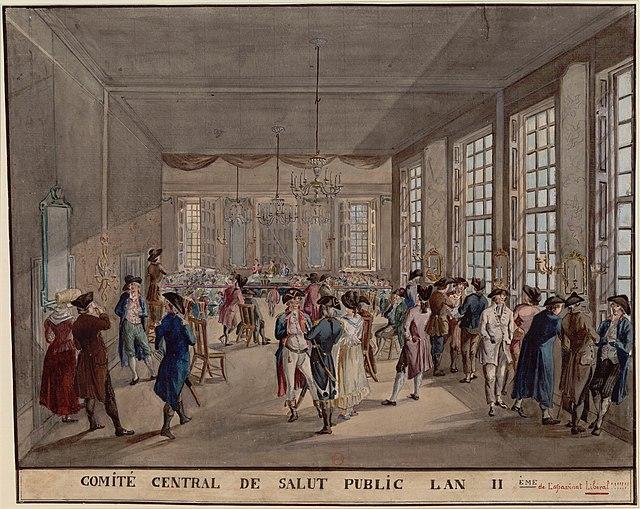
Why should any living person dwell on the French Revolution? Well, there is more to it than picturesque Parisian backdrops, powdered wigs, and peculiar costumes. On the other hand, the powerful image of a blood-spattered guillotine may give us a hint! In deference to true wisdom, let us therefore take the opportunity to quote the Spanish-American philosopher George Santayana: “Those who cannot remember the past are condemned to repeat it.”
Although we tend to congratulate ourselves on living in a so-called “knowledge society,” school education is in decline. The development is practically the same throughout the West. In any case, knowledge is very unevenly distributed in society. The academic standards of present-day curricula in both primary school and university are being lowered in favor of politicization and indoctrination. The principles of “diversity, equity, and inclusion” are at variance with the classical ideals of academia.
To be sure, intellectual corruption poses a major threat to the survival of Western civilization. That the younger generations have not learned history in school actually represents an inexcusable neglect. When distanced from the moral basis of the church and largely uncultured, discounting the erratic impact from social media, they become extremely sensitive to extremist propaganda. Ignorant of historical facts in outline or depth, they relate uncritically to ideologically distorted narratives such as that of racism as the driving force in history. Immature megalomaniacs and with an appetite to be in the front row, which is typical of youth at all times, they are too easily seduced by the sirens of totalitarianism. They lack an enlightened, independent perspective. We have let them down. Now they are taking revenge.
History offers lessons of obvious importance to our ongoing adaptation. In the time around the Reign of Terror, philosophical masterminds on good terms with the Jacobins introduced the prototypical concepts of (a) secularism, (b) egalitarianism, and (c) economic centralism (planned economy, big government), which initially seemed perfectly rational, overthrowing the hated system of privilege intrinsic to l’Ancien Régime. In fact, however, they deluded humanity, paved the way for tyranny, and ultimately led to immeasurable suffering.
An institutional prototype deriving from the French Revolution was the Committee of Public Safety. The governmental functions assumed by this body, which acted in the name of the people, whatever its bloody excesses on the scaffold, concentrating legislative and executive powers in the hands of its members, confirmed the totalitarian nature of the revolution. The operations of similar bodies, e.g. the central committees of the Soviet Union and the People’s Republic of China, have since led to human sacrifices in the millions. Oppression of the individual citizen and the entire people (by extension) is the empirical consequence of a self-righteous, puritanical, and tyrannical pursuit of human and social perfection, respectively.
In the West, the modern welfare state saw the light of day after the abominations of World War II. As a social model, it was at first in sharp competition with the realized Marxism of the East. The rate of development, of course, depended on local conditions, incl. political-economic opportunities, social institutions, and history — in short, culture.
From the very beginning, social engineering beckoned as an ideological approach to the modernization of society, whether publicly acknowledged or not. Also for those who give the appearance of social engagement, fervidly advising and supporting others in return for political power (e.g. trade unionists, as opposed to awkward theorists tucked away in libraries), there may be a totalitarian temptation to interfere in the lives of others and rule over them as if they were children without the right of self-determination.
Mainstream leftists secretly envied their comrades for their unassailable monopoly of power on the other side of the Iron Curtain. Seeking an ideal society that combined egalitarianism with a relatively high level of material prosperity (i.e. contrary to the conditions in the Soviet sphere of influence), however, progressive forces in both Europa and North America long tended to highlight Sweden, spared from war ravages and with a profitable heavy industry to subsidize utopian experiments, as an example to follow. In Portugal and Spain, by contrast, conservative dictatorships were back then given to suspicion, and managed to delay the seemingly inevitable development for a while.
In the light of hindsight, conservative observers are prepared to admit their reservations and clarify that the welfare state, for all the good intentions, reinforced universal decadence across the West. Originally, the core services, based on the premise that we are equal before the law, sharing a common morality, including minimum standards of social justice, consisted of (a) public health care, (b) merit scholarships, and (c) temporary unemployment benefits. However, there has been a shift away from these services toward (de facto) unqualified entitlements.
The very idea that you, simply by virtue of being, should be entitled to wealth generated by others is like the introduction of a new system of privilege. When this concession of entitlements, ultimately at the cost of core services of the welfare state, is furthermore extended to the destitute masses of the Third World, who are crossing European and North American borders by the millions, we are undoubtedly heading for disaster. The unlimited generosity of leftists, in addition to the short-term desire to bribe voters at the elections, masks the intention to bring down the West; they are busy “redistributing” its wealth so as to accelerate its collapse.
Uncontrolled immigration from Third World countries at the invitation of the progressive elite, which has recently fallen in love with the exotic and is in the process of betraying its historical ties with the working class at home (accused of simple-minded bigotry), pushes the welfare state to its limit. In these years, when several countries in the West are reaching demographic milestones, the resources in (a) healthcare, (b) education, and (c) social services, are being depleted by foreigners. (Of course, immigrants expand the national economies of their host countries whether they are self-supporting or not.)
We should have known better in the West. Sure, we resisted the military threat of the Marxist Warsaw Pact, but we got cocky, refused to recognize the danger in time, and lost to the totalitarians who invaded our societies with identity politics instead of tanks. What we, socially alert, were conscientiously, and energetically building together in the post-war period looked like the capstone of civilization. However, we messed it all up for nothing.
In the end, the culture sickness of the early twentieth century caught up with us — a truly sadomasochistic, nihilistic self-degradation in the wake of World War I. With our eyes open, we chose to betray ourselves, surrender to the totalitarians, and write ourselves out of history. It is obviously one of the ways in which an honorable and humanistic, but also unforgivably decadent, civilization may leave the world.
As for the highly praised welfare model of yesteryear, the politically harmonized, social democratic utopia, the home of “soft totalitarianism,” Sweden is falling apart as a society. Its patronizing leaders, who long denied human nature (including the deep attachment to family and faith), and believed that they could create a new human being (i.e. a docile “homo socialisticus”) with unbreakable ties to the welfare state, were horribly mistaken. From having epitomized a (a) “culture of trust,” (b) “homogenous societal culture,” and (c) “rule-based, industrious, and stable culture,” where a solid majority of center-left voters agreed to work for the common good, the so-called “Folkhem” (People’s Home) has turned into a multicultural battlefield, an increasingly violent society segregated along ethnic lines. Stabbing, shooting, and throwing grenades have become commonplace. As during the French Revolution, though in the current setting of unprecedented immigration and skyrocketing crime, the prospective utopia is giving way to dystopia, order to chaos.
If only we had learned from history.
<img alt="Bibliothèque nationale de France, Public domain, via Wikimedia Commons" captext="Bibliothèque nationale de France, Public domain, via Wikimedia Commons” src=”https://conservativenewsbriefing.com/wp-content/uploads/2024/04/wealth-and-redistribution.jpg”>
Image: Public domain.





